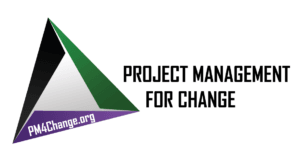Servant Leadership
By guest author Mike Hannan, CEO Project Management for Change

There’s been a welcome and growing interest in recent years in the notion of “Servant Leadership,” but unfortunately, an embarrassingly stark contrast between such interest and our collective ability to achieve the hoped-for results that Servant Leadership should spawn. Whenever I come across such wide chasms of disappointment, I immediately look for the inevitable “mindset block” that must exist–that is, we must be missing something big in how we think about such things. A logical place to start is to give a look at leading definitions, and then take things from there.
So, where do most leading definitions of Servant Leadership focus? Appropriately, they start with lofty-sounding aspects such as serving others, pursuing a juster and more caring world, and leading by example to inspire others to follow. But unfortunately, most stop there. What’s missing is any aspect of “impact,” or a sense of urgency to achieve the biggest positive set of results possible, as soon as possible. For example, Martin Luther King, Jr. did way more than inspire others with his, “I have a dream” speech–he followed up with a concrete set of plans to deliver on specific initiatives, and mobilized the people and resources necessary to achieve measurable results at scale. Many, many people have shared that same dream, but MLK Jr. was one of the few Servant Leaders who followed through to help bring the vision closer to reality and did so much faster than others before and since.
What’s missing, then, is a discipline for achieving the biggest set of positive results possible, as soon as possible, for the least reasonable effort and cost–in other words, the discipline of Project Management. But here we run into another, similar problem: just as there is a mindset block preventing us from achieving what servant leadership envisions, there is a twin mindset block preventing the Project Management profession from holding up its end of the equation. More specifically, leading definitions of Project Management fail to mention that its enormous power comes from its ability to create such massive positive impact–and if that isn’t its central purpose, then what is?
Fortunately, some non-profit organizations are nurturing an emerging movement to couple Servant Leadership and Project Management. Sometimes called “Collective Impact,” the emphasis is on orchestrating the efforts of an otherwise fragmented non-profit sector toward the achievement of common goals–and doing so much faster and with fewer resources than would otherwise be the case. Project Management for Change is beginning to try its hand at this, by aligning multiple non-profits sharing similar goals and helping them plan and execute initiatives that might deliver a more significant positive impact than would be possible if they all proceeded with implementing their own plans.
With servant leadership and project management principles, more leaders can follow the lead of Martin Luther King Jr., achieving their dreams of making real and lasting impacts on their local communities and even the global community. An example of this is provided at Project Management for Change’s signature Project Management Day of Service® (PMDoS) events around the world. On January 16, 2017, Martin Luther King Jr. Day, a national day of service, more than 250 project management volunteers came together to help launch more than 50 critical nonprofit initiatives spanning three major metropolitan areas—Washington, DC, New York, NY, and Norfolk, VA. The session connected seasoned project managers and subject matter experts with community nonprofit organizations whose missions include helping families, children, the arts, career development, military, veterans, and those providing legal aid. Each of the nonprofit organizations received nearly $2,000 in consulting services at no fee, and which helped generate an estimated $600,000 in benefit to the community. Keynoting the event was Ms. Wendy Spencer, CEO of the Corporation for National Community Service (www.NationalService.gov), which spearheads federally-funded volunteer initiatives such as AmeriCorps.
As we continue to support our mission to transform communities around the world through the project management profession, our PMDoS events have spread across the United States and throughout multiple continents. From our headquarters in the Washington Area, we partner with various organizations and volunteers across the globe, bringing events to New York City to Queensland, Australia to the United Kingdom and more!
——–
Mike Hannan is an entrepreneur, best-selling author, keynote speaker, and innovator of industry-leading techniques to drive unprecedented improvements in IT project portfolio performance. His background in Project Portfolio Management (PPM) started at NASA in the early 1990s supporting large, complex initiatives such as the International Space Station. As CEO of Project Management for Change, he leads its mission to unleash the boundless potential of the project management profession to empower and transform communities around the world. They do this through pro-bono support by professional project managers of non-profit organizations’ most pressing world-changing initiatives. Please feel free to learn more and reach out to us at www.pm4change.org.
Launch Workplaces not only supports local businesses; it also proudly supports local community groups for their meetings at no charge. One such group that meets regularly in our space is Project Management for Change. We are pleased to feature them today in our newsletter to share the message of their mission and to help make a difference in the world around us.



